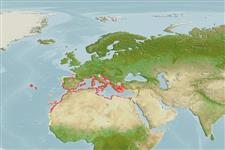Teleostei (teleosts) >
Blenniiformes (Blennies) >
Blenniidae (Combtooth blennies) > Salariinae
Etymology: Lipophrys: Greek, lipos = fat + Greek, ophrys = eyebrow (Ref. 45335).
More on author: Valenciennes.
Environment: milieu / climate zone / depth range / distribution range
Ecology
Marine; demersal. Subtropical; 49°N - 20°N, 19°W - 36°E
Eastern Atlantic: Along the coasts of France (Brittany), the Iberian Peninsula, Morocco, the Mediterranean and the Sea of Marmara southwards to Senegal, the Canary Islands and Madeira.
Size / Weight / Age
Maturity: Lm ? range ? - ? cm
Max length : 13.0 cm TL male/unsexed; (Ref. 5981)
Facultative air-breathing (Ref. 126274); Adults are found in intertidal areas (Ref. 31184), like wave-battered rocky shores of coastal waters (Ref. 5298). They prefer crevices and troughs in steep walls. Breathe air when out of water under rocks or seaweeds (Ref. 31184). Very inactive except during spawning. They feed on mussels, other benthic invertebrates and algae (Ref. 5981). Only known nocturnally active combtooth blenny (Ref. 42918). Oviparous. Eggs are demersal and adhesive (Ref. 205), and are attached to the substrate via a filamentous, adhesive pad or pedestal (Ref. 94114). Larvae are planktonic, often found in shallow, coastal waters (Ref. 94114).
Life cycle and mating behavior
Maturities | Reproduction | Spawnings | Egg(s) | Fecundities | Larvae
Oviparous, distinct pairing (Ref. 205).
Bath, H., 1990. Blenniidae. p. 905-915. In J.C. Quero, J.C. Hureau, C. Karrer, A. Post and L. Saldanha (eds.) Check-list of the fishes of the eastern tropical Atlantic (CLOFETA). JNICT, Lisbon; SEI, Paris; and UNESCO, Paris. Vol. 2. (Ref. 5298)
IUCN Red List Status (Ref. 130435)
Threat to humans
Harmless
Human uses
Tools
Special reports
Download XML
Internet sources
Estimates based on models
Preferred temperature (Ref.
123201): 16.1 - 21, mean 18.9 °C (based on 496 cells).
Phylogenetic diversity index (Ref.
82804): PD
50 = 0.7500 [Uniqueness, from 0.5 = low to 2.0 = high].
Bayesian length-weight: a=0.01000 (0.00529 - 0.01890), b=3.13 (2.96 - 3.30), in cm total length, based on LWR estimates for this species & (Sub)family-body (Ref.
93245).
Trophic level (Ref.
69278): 4.5 ±0.0 se; based on diet studies.
Resilience (Ref.
120179): High, minimum population doubling time less than 15 months (Preliminary K or Fecundity.).
Fishing Vulnerability (Ref.
59153): Low vulnerability (10 of 100).
